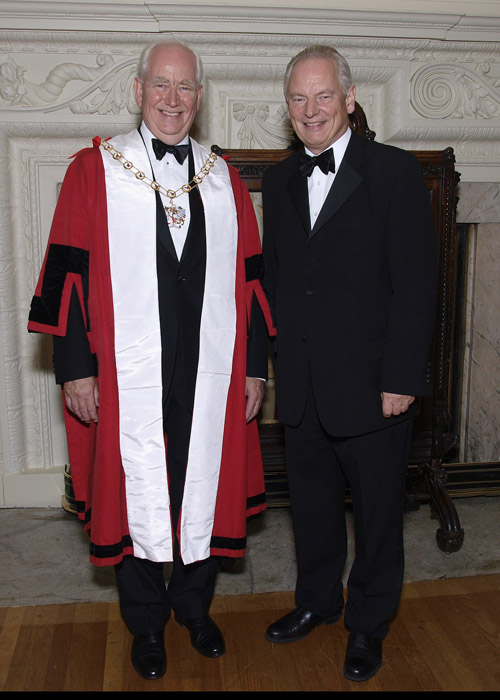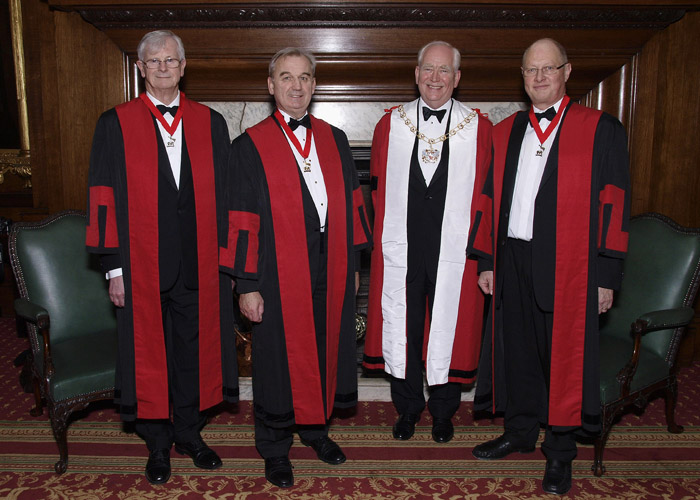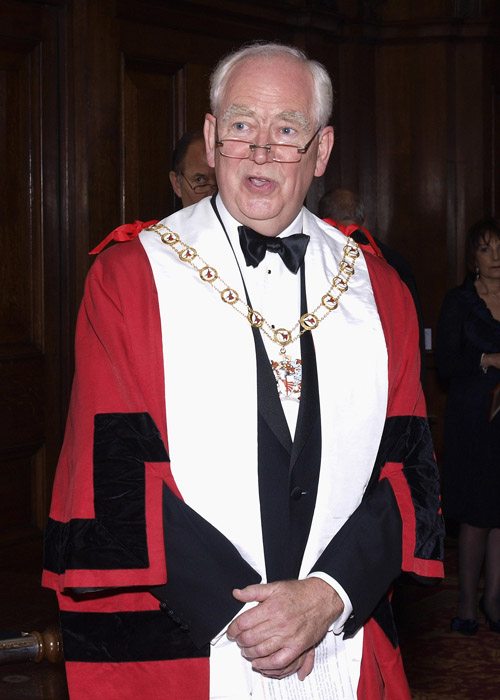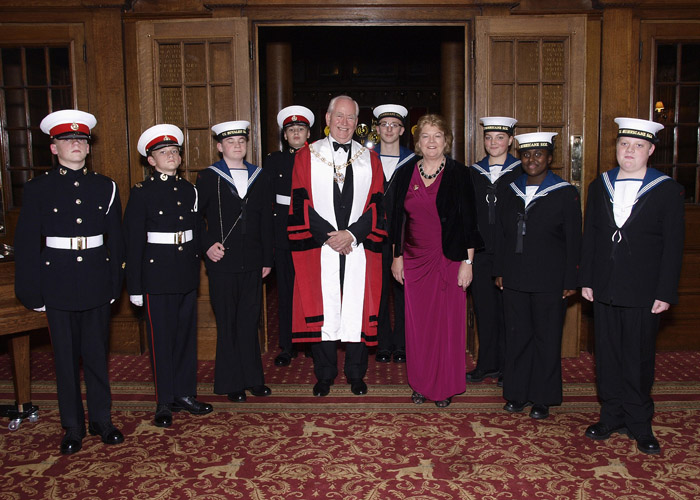Cabinet Office Mininster welcomes our Master
 Taking time out from his role as Minister for the Cabinet Office and Paymaster General, looking for government savings "well in excess of £8bn", The Rt Hon Frances Maude MP gave the keynote address at the installation dinner that heralded Geoff Llewellyn as our current master.
Taking time out from his role as Minister for the Cabinet Office and Paymaster General, looking for government savings "well in excess of £8bn", The Rt Hon Frances Maude MP gave the keynote address at the installation dinner that heralded Geoff Llewellyn as our current master.
Here are the notes for his speech:
"When we came into office I was given a task by our Prime Minister – to take out wasteful spending and protect frontline services. We couldn’t do this just by tinkering with and trimming Departmental budgets as countless Governments have done in the past. We had a far more radical plan – to turn a sprawling, uncoordinated array of Departments and Government bodies into a leaner, more effective machine that managed its finances like the best run businesses. So for the first time, like any large business, there is now an effective operations centre at the heart of our government:
- The Cabinet Office’s Efficiency and Reform Group - chaired jointly by myself and the Chief Secretary to the Treasury – pulls together under one roof all cross-Government operational functions including procurement, ICT, communications, property.
- We are the taxpayers’ champion – operating at the centre of government with a strong mandate to clamp down on unnecessary spend, drive up efficiency and improve accountability in these areas.
And in our first ten months in office we saved what was then an unprecedented £3.75 billion from central Government spend. And in August I announced that in 2011-12 we saved a further £5.5 billion.
Consultancy safety blanket
 We made these savings by introducing tough spending controls within the first days of this Government. These controls limited expenditure on IT contracts, property, marketing. And yes - on consultants, contractors and contingent labour:
We made these savings by introducing tough spending controls within the first days of this Government. These controls limited expenditure on IT contracts, property, marketing. And yes - on consultants, contractors and contingent labour:
- Last year our moratorium on new consultancy spend, and on extending existing contracts, saved us £1 billion. Overall we have cut out over 80% from the last Government’s huge, unsustainable consultancy bill.
- As consultants you may not applaud this, but as taxpayers you might.
Frankly the last government used consultants as a comfort blanket. If there was anything difficult to be done, they would reach for consultants immediately.
Particularly damaging has been the instinctive hiring of external consultants to run any kind of complex procurement. In too many cases this has led to consultants being paid on day rates with little or no incentive to get procurements finished speedily, or to drive simplicity.
In this mould, far too many procurements ended up featuring absurdly over-prescriptive requirements. This kind of procurement drives out innovative and competitive suppliers.
Now we are committed to procuring on the basis of the outcomes, not inputs. And now the use of consultants anywhere in central government procurements requires my express agreement. That’s not to say we won’t continue to use consultants – we will – but we will use them only when there is a clear, convincing business case to do so.
Civil Service Reform
 The other problem with the overuse of consultants was it reduced the need and ability for public officials to develop skills in areas like IT Architecture, complex negotiations, and financial management. It actually undermined the position of mainstream civil servants. This was part of a wider problem with the civil service – a failure to internally build and sustain critical skills to running a modern government - procurement, finance, accounting, operational delivery. But there is no reason why we cannot build world class expertise within the civil service. And this Government is reforming the civil service to do just that. No longer will we have a generalist civil service dominated by policy folk - we will create a more balanced set of leaders and practitioners in government:
The other problem with the overuse of consultants was it reduced the need and ability for public officials to develop skills in areas like IT Architecture, complex negotiations, and financial management. It actually undermined the position of mainstream civil servants. This was part of a wider problem with the civil service – a failure to internally build and sustain critical skills to running a modern government - procurement, finance, accounting, operational delivery. But there is no reason why we cannot build world class expertise within the civil service. And this Government is reforming the civil service to do just that. No longer will we have a generalist civil service dominated by policy folk - we will create a more balanced set of leaders and practitioners in government:
- So the most interesting and high value work in government in the future – will be done by civil servants themselves, not consultants.
This has started already. Earlier this year I launched a Major Projects Leadership Academy, which will ensure major government projects in the future are led by people equipped with the necessary skills and resources. We’re also creating a Commissioning Academy for full launch next year for leadership teams across the public sector.
Good news for business
This doesn’t mean we think Government has a monopoly on policy-making expertise – far from it:
- You may be aware that we have already begun to pilot Contestable Policy development, where we will draw on expertise from beyond the civil service to develop policy for Ministers. While we had think tanks and academics particularly in mind we will also welcome the knowledge of consultants – particularly those offering their services at think tank rates!
- More generally this Government is keen to introduce new players into all aspects of our supplier markets.
- There will be new and exciting opportunities for business and pitching for them will be quicker and cheaper as we continue to reform our procurement practises.
 I have led the work to make it easier for smaller firms to bid for government work, and this should encourage many of you to approach us. We’re hunting for innovation today and ways of delivering services better and that means we’re opening our doors to all kinds of commercial models for public sector delivery - such as the recent creation of the mutual joint venture MyCSP, and many more on the way. These are ground-breaking models for businesses to get involved in. Our public services need radical, dynamic, pioneering solutions – some of that will come from in-house, some of it will come from the people in this room. Yes ideas need to be to a high standard – yes they need to be practical, quick, yield material return, and be very well thought through business propositions.
I have led the work to make it easier for smaller firms to bid for government work, and this should encourage many of you to approach us. We’re hunting for innovation today and ways of delivering services better and that means we’re opening our doors to all kinds of commercial models for public sector delivery - such as the recent creation of the mutual joint venture MyCSP, and many more on the way. These are ground-breaking models for businesses to get involved in. Our public services need radical, dynamic, pioneering solutions – some of that will come from in-house, some of it will come from the people in this room. Yes ideas need to be to a high standard – yes they need to be practical, quick, yield material return, and be very well thought through business propositions.
And at the same time we in Government, as clients, need to get smarter at asking for help in solving tough problems in a way that is designed to tap into the best in the market. In other words we will procure for advice based on outcomes, not on very narrowly defined specifications. We will work much harder in structuring engagement on a Payment by Results basis for example - so we can make a direct link to value and put pressure on ourselves to implement good advice. But I can promise you we will be quick to open our doors to the best, the most innovative, the most competitively priced solutions out there.
And if you have innovative ideas to run a service in a cheaper way, no matter how radical it is then let us know.
I’ll be driving this agenda across Government and I can guarantee Government will be listening to your ideas.